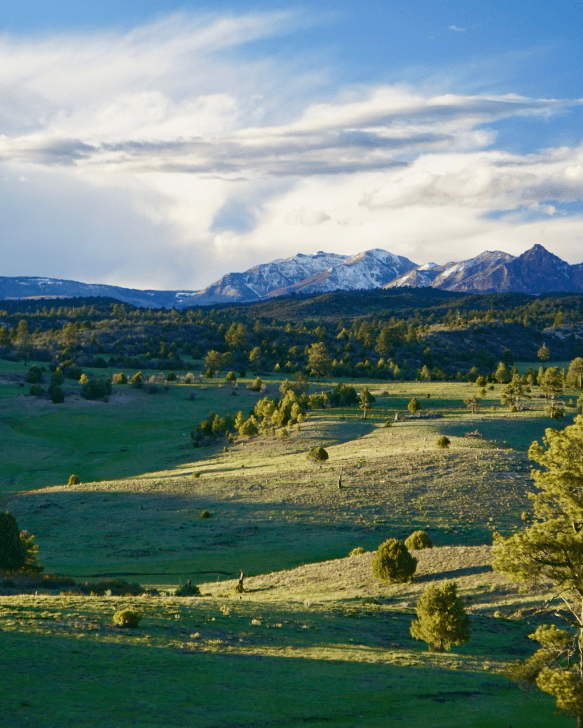https://www.harriganland.com/mountain-ranches-income-producing-investments/(opens in a new tab)
Mountain ranches embody the richness of land, dirt, water, minerals. They present opportunity. Creative ranchers take those opportunities and multiply them. We often see quiet or dormant properties next to other fully enhanced properties. The way to improve income on a ranch you now own will also be right for other Rocky Mountain Ranch investments.
As the owner, you are in control. One of the best things about owning a ranch is having the space to change the purposes and activities of the property over time. What works one decade may not work as well for the next. You’ll notice ranchers stay on top of trends.
Appreciation and Income Producing Ranches
Over time, most real estate appreciates in value. This is especially true in the Rocky Mountains. We may call it income, but real estate investments also improve the portfolio through long-term appreciation. The value of real estate investments stems from two things. Net profit and capital appreciation. While annual net profits may be minimal, the location of a ranch and the demand for the ranches often increase over time. The financial picture includes both elements.
Studying Mountain Ranches
And there’s more to learn. Before signing on to own a ranch in the Rocky Mountains, be aware of the factors that could affect the bottom line. Folks often aren’t so concerned with finances but want a ranch for family recreation.
However, after the 2008 recession, the inflation, stock market vulnerabilities, and low-performing bonds sent investors to the real estate market. More specifically in our industry of large mountain properties, buyers began studying the investment opportunities connected with ranch real estate. Investing in large ranches became another avenue to create income and stabilize portfolios.
Factors to Consider for Ranch Investments
Bring your microscope on the hunt for ranches for sale. Premier investments may show up in a quick online search. But a real estate broker specializing in ranches and large acreage will point out hidden details you need to ponder. Run the numbers for various scenarios.
Put these details under the microscope to see how they affect the ranch investment:
Corporate structures: When you set it up as a business, find out all the ins and outs of each type of options – partnerships, LLCs, S-corporations, trusts.
Types of operations: Primarily, ranches are owner-operated, where they take care of most every aspect or they may be organized as corporate businesses. Every kind may deal with leases – leasing out property or maybe partnering with another rancher to graze on the owner-operated ranch. These arrangements may change from time to time.
Land management: Optimal management plan include irrigating, farming, or grazing. If unused, any formerly irrigated pastures may degrade if left unused.
Property taxes: Agricultural properties see the lowest tax rates. One exception is Wyoming where they use an assumed production value. Otherwise, an investor who plans to hold onto a ranch may even remove older improvements to lower taxes.
Income tax deduction: Do you know the IRS allows deductions for ranches registered as businesses? Business deductions such as property taxes, insurance, mortgage interest, upkeep, legal and accounting fees are all deductions. So are irrigation and District fees and mileage expenses.
Capital gains: If the ranch is well-managed, it will experience capital appreciation. The IRS Section 1031 exchange allows deferred taxes if businesses reinvest in another business property.
Ask Yourself Nitty Gritty Questions
To make use of all the resources available on ranches in Colorado, the ranch owners assess dozens of factors. It’s not often that a farmer or rancher buys his property and has a big family to run it. And every initiative takes work. The quest to produce income on a ranch begins with thoughtful measures such as:
- What natural activities would the ranch support?
- Are they seasonal?
- Are improvements needed?
- What will improvements cost?
- What equipment is necessary?
- Is there a demand for a product or service?
- Will I need to market my product or service?
- How will adding more activities effect my insurance rates?
- Am I willing to support the ranch appropriately?
- Will my taxes change?
- Do I have the umph to carry through a plan and sustain it?
- Do I need more employees and skill sets?
Ideas for Supplementing Ranch Income
Right off the top, large ranch owners know they can improve income by hustling. If there are existing improvements – stables, fencing, water sources – these ranchers can at once open side activities. Before diving in headfirst, nonetheless, they will assess the market for anyone of them. For example, a fenced ranch is primarily for hunting might board horses. Another might irrigate extra acreage to keep livestock.
- Board Horses
- Offer Hunting
- Supply Access to Fishing
- Lease Sections
- Farm
- Raise Livestock: Though we don’t hear cowbells in the Rockies, income producing ranches in the Rocky Mountains often run cattle.
- Raise Goats
- X-Country Skiing Trails
- ATV Tours
- Rock Climbing
- Hold Events
- Build an Attraction
Let’s talk about these another time. Until then, think how you could multiply your resources by investing in a large mountain ranch in the USA.
Brokers – Income Producing Ranches
Find out about mountain ranches in Colorado, New Mexico, Wyoming, Utah, and Montana. Call Harrigan Land Company at 303-908-1101.


